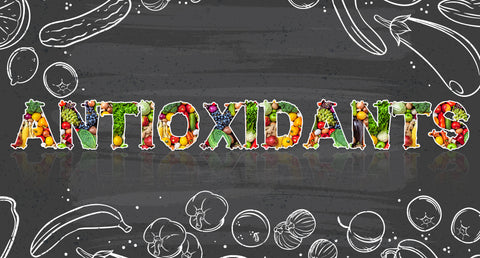When it comes to keeping our cells and tissues healthy while preventing them from getting damaged, antioxidants holds an important position in the hierarchy. Antioxidants are compounds which are capable of protecting our cell membranes from getting damaged. They are naturally present in our food or can be taken in the form of supplements as well. Our body also synthesises some antioxidants naturally like Glutathione.
Antioxidants are proficient in damaging free radicals, that are produced naturally as a byproduct of biochemical processes occurring in our body. These are unstable atoms with a potential of damaging our cells and increase the risk of developing certain diseases like cancer, cardiovascular diseases, etc. Some other reasons which can increase the production of free radicals in our body are cigarette smoke, pollutants, certain drugs, pesticides, inflammation, etc.
Antioxidants and their rich sources -
- Allium sulphur compounds : Onions, garlic and leeks.
- Anthocyanin : Berries, grapes and brinjal.
- Beta - carotene : Carrots, cantaloupe, lettuce, spinach and pumpkin.
- Catechin - Tea and red wine.
- Copper - Seafood, milk, nuts and lean meat.
- Flavonoids - Parsley, citrus fruits, blueberries and apples.
- Cryptoxanthin - Red capsicum, pumpkin and mangoes.
- Lutein and Zeaxanthin - Green leafy vegetables, peas, egg yolk and corn.
- Lycopene - Tomato, red carrots, watermelon and papaya.
- Manganese - Seafood, tofu, sweet potato, spinach and pineapple.
- Selenium - Brazil nuts, fish, chicken, eggs and sunflower seeds.
- Vitamin A - Eggs, broccoli, cod fish, liver, sweet potato and spinach.
- Vitamin C - Cherries, guava, amla, parsley and thyme.
- Vitamin E - Wheat germ, nuts, sunflower seeds and broccoli.
- Zinc - Meat, fish, legumes, nuts and dairy.

Why Antioxidants?
- Vision Health - Studies have shown that antioxidants like lutein and zeaxanthin, have the ability to reduce the risk of developing age-related macular degeneration. Macular degeneration refers to deterioration of central retina eventually progressing to vision loss. Central portion of retina is referred as macula which controls visual acuity. As we grow old, the possibility of losing vision increases. Clinical findings of several studies suggested that a diet rich in antioxidants especially lutein and zeaxanthin preserves eye health and prevents diseases like glaucoma, cataracts, etc.
- Brain Health - Our brain requires ample amount of oxygen to function properly which in turn leads to accumulation of free radicals. This is where antioxidants comes to rescue and counteracts the effect of oxidative stress. Oxidative stress refers to an imbalance condition of free radicals and defensive radicals fighting antioxidants. Flavonoids are specialised in improving brain functioning and reducing risk of memory related disorders like Alzheimer.
- Heathy Heart - It has been shown that oxidative stress is linked with pathogenesis of cardiovascular disorders, atherosclerosis and coronary artery diseases. Presence of oxidants triggers inflammation, thrombus formation and damage to blood vessels. Researchers believe that diet rich in antioxidants is capable of preventing damage to heart, related disorders and promotes overall health.
- Cancer Prevention - Antioxidants have also been linked to prevention of chronic degenerative disease like cancer. High concentration of free floating radicals can damage cell proteins and DNA. Antioxidants neutralises free radicals and disallow harmful cells from getting active thus, curtailing cancer risk.
- Reduced Ageing - Ageing indicates progressive loss of tissue and organ function. Studies have shown that antioxidants like catechin, polyphenols, anthocyanin are capable of extending the lifespan. Accumulated free radicals vandalises our cell’s membrane permeability eventually causing cellular dysfunction.
To conclude, antioxidants are good for our health and effective in preventing the onset of certain diseases but it doesn’t mean that excess intake of these will exhibit same effects. Therefore, opt for natural source of antioxidants by including lots of fruits and vegetables in a well-balanced diet.


